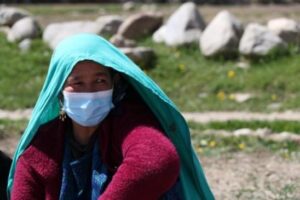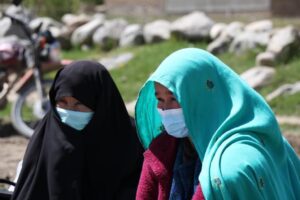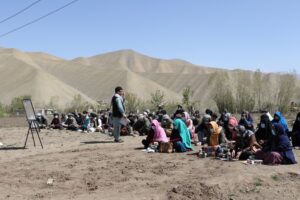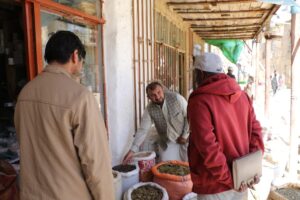Address:
- Street # 5 of Syloo, House # 152-153, District 3, Kabul, Afghanistan
- info.afg@dca-af.org
- Sun - Thu: 8.00 AM to 4.00 PM

“My income has increased mainly due to the reduction of animal diseases and use of livestock feed that led to a better-quality wool to sell it to the stop-shop keeper.” Ms. Sugra.
In my recent visit of the Afghanistan Competitiveness of Export-oriented Businesses Activity (ACEBA) Project funded by USAID in Bamyan Province, I spoke to herders, stop-shop keepers, central hub sales points, and feed suppliers. The project integrates herders, stop-shop keepers, and local traders to build their income across the value chain.
Ms. Sugra who is the breadwinner of 8 children and Ms. Kubra a breadwinner of 7 children from Zar Khawal village, expressed their happiness with the project that helped them improve their livelihoods. “My income has increased mainly due to the reduction of animal diseases and use of livestock feed that led to a better-quality wool to sell it to the stop-shop keeper”, said Ms. Sugra. Ms. Kubra on the other hand indicated that, “before the start of the project a year ago, mortality of animals was more than 50% in my neighborhood, but thanks to the project, now there is zero mortality.” A recent study in Afghanistan suggests that mortality reduced from 25-30% to 2-3% as a result of DCA’s interventions.

Fig 1: Ms. Sugra(right) and Ms. Kubra (left) are two of the herders benefiting from the project.
The rural herders are primarily trained on the collection of wool and cashmere, diseases that impact the quality of these products, seasonal vaccination, and linkages to feed traders (see fig 2). Dr. Amanullah explained to the herders during an extension training that, “you have the stop-shop keeper in your village to sell your collected wool and cashmere to. The Veterinary Field Unit (VFU) is available nearby to provide seasonal deworming, treatment, and vaccination services for your sheep and goats. Feed can be purchased from nearby feed traders using the cash grant that has been distributed. We hope that this will lead to improved income and livelihoods for the community. There are currently 54 herders participating in this extension session, with 40% of them being women.

Fig 2: Dr. Amanullah Mahir (DCA’s Community Mobilizer) has trained 54 herders (40%) women on seasonal diseases, wool and cashmere collection processes, and linking herders with feed traders.
Stop-shop keepers like Mohammad Ali (Fig 3) not only buy wool and cashmere but also employ women to help them clean, sort and spin. Mohammad recruits 200 women for spinning and 15 women for washing of the wool. He pays Afs 70/kg for the spinning and Afs 300/day for washing. He has already collected 7 tons of wool in 2023, and expecting to increase the volume when the herders from the mountains of Bamyan start to sell their products.

Fig 3: Mr. Mohammad Ali – a stop-shop keeper in Bamyan District Center
There are more than 10 feed traders in Bamyan Center with concentrated feed in their stock for dairy, beef, lamb fattening and poultry farms (both broilers and layers). The main ones I observed are sunflower meal, cottonseed meal, wheat bran, ground corn grain, ground wheat grain, ground barley grain, and mixed feed.

Fig 4: Feed traders in Bamyan Center
Ms. Sugra and
Kubra would appreciate it if the project activities were expanded
geographically and include other livestock products such as dairy, skin, live
animals, poultry, and similar products. This includes a demonstration of
improved stable refurbishment, churning machines, Quroot (locally made dry
cheese), hygienic kits, access to vaccination, other animal health services,
and marketing. The expansion and broadening of the project are in the plans of
the EU project.
DCA, through the USAID (ACEBA) funding supports
27,000 herders, 450 stop-shop keepers, and 21 central hub stop-shop keepers in
21 Provinces of Afghanistan. In total, the project benefits 27,471 HHs
directly, and more than 200,000 indirectly through job creation along the value
chain. In 2022, more than 672 MT of wool and 22 MT
of cashmere was collected from the herders by stop-shop keepers and sold to
exporters. As a result of this intervention, USD 60,142 worth of transactions
took place between herders and stop-shop keepers in a period of 8 months.

Leave A Comment